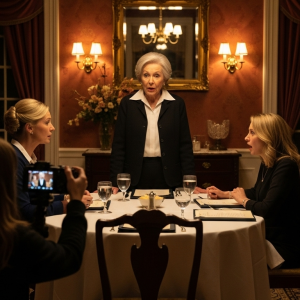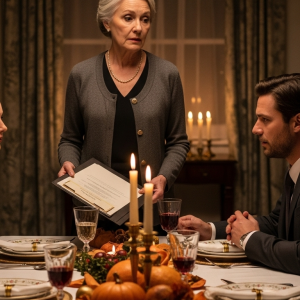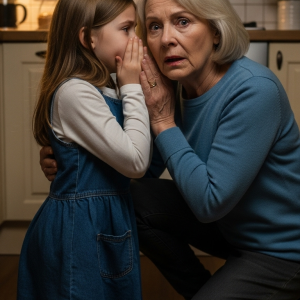The autumn wind rattled the old windows of our Chicago brownstone, a sound that had always felt like a comforting embrace. I sat in the warm silence of the living room, a small plastic stick held tightly in my hand. My heart hammered against my ribs. Two clear, impossibly red lines. After three long, aching years of waiting, of whispered prayers in the dark, the moment my husband, Brian, and I had dreamed of was finally here.
“Brian!” I called out, my voice trembling with an excitement so pure it felt like a physical force, a light blooming in my chest.
He emerged from his study, a line of concentration still etched on his brow. He was a pharmaceutical researcher, a man who lived in a world of data and precision. “What’s wrong, Melissa?” he asked, his tone analytical.
I didn’t speak. I simply held out the test. Brian’s blue eyes, usually so calm and measured, widened. In that single instant, the scientist vanished, replaced by a man overwhelmed with pure, unadulterated joy. He swept me into a fierce embrace, lifting me off the floor.
“I can’t believe it,” he whispered into my hair, his voice thick with emotion. “Is this real?”
“We’ll need the doctor to be certain,” I laughed, my own voice buoyant and breathless, “but my heart is sure.”
That night was a celebration of a future that suddenly felt tangible. I toasted with sparkling apple juice while Brian raised a glass of expensive wine. Baby product catalogs were already fanned across our dining table, their glossy pages filled with promises of a new life.
“When you’re pregnant, I absolutely will not let you overdo anything,” Brian said, his hand covering mine, his sincerity a tangible warmth. “You should switch to working from home immediately. Your health, and the health of our baby, is the only variable that matters now.”
My heart swelled with love for him. Brian had always been a thoughtful, logical man, but the news of our impending parenthood had unlocked a new, profound level of devotion. At the obstetrician’s office the following week, when the doctor officially confirmed the pregnancy, Brian wept openly, thanking the doctor with a choked voice that made my own eyes well up with tears.
“The new drug development project at the lab is entering a critical phase,” he told me later that week, his expression apologetic. “I might not be able to make it to many of the checkups. But I need you to know that you and the baby are my top priority. Always.”
I understood completely. His work was demanding, and his actions spoke far louder than his presence at routine appointments ever could. Every single evening, without fail, he would come home from the lab, kneel before me, and place a gentle hand on my still-flat stomach. “How was your day in there, little one?” he’d murmur to our unborn child. “Daddy is looking forward to meeting you so, so much.”
In those moments, wrapped in the safety of his love, I knew I was the luckiest woman alive. Brian was the perfect husband: logical and calm like the scientist he was, yet filled with a deep, unwavering love for the family we were building.
The first few weeks of the pregnancy were a blur of severe morning sickness. Nausea was a constant, unwelcome companion. For days on end, I could barely keep water down, let alone a meal. Without a moment’s hesitation, Brian took over our lives completely.
“Think of this as an experiment in the lab,” he joked, his arms piled high with nutrition books he’d ordered. “I will calculate the exact nutrients you and the baby require and design the optimal meal plan for this phase.”
His approach was nothing short of meticulous. He created complex spreadsheets on his laptop, tracking my daily intake of folic acid, iron, and calcium down to the microgram. He crafted gentle, soothing meals—delicate ginger and lemongrass soups, specific brands of organic crackers, banana and yogurt smoothies—all scientifically designed to be as palatable as possible for my weakened stomach.
“I’ve made a graph tracking your weight against the baby’s projected growth curve,” he explained one evening, showing me a handmade chart with a perfect, ascending line. “At this pace, you’ll have an ideal weight gain with minimal stress on your system.”
I was profoundly grateful. Left to my own devices, I would have subsisted on toast and despair. Thanks to Brian’s scientific devotion, I felt I was navigating this difficult period with the best care imaginable.
As the morning sickness finally subsided around the fourth month, Brian’s culinary enthusiasm only intensified. He began sourcing expensive organic vegetables from specialty markets and ordering high-quality supplements online.
“This is the latest product a colleague at the lab recommended,” he’d say, holding up a new bottle of pills. “It contains proprietary compounds developed by a Japanese pharmaceutical company, said to be exceptionally effective for fetal brain and nervous system development.”
Every morning, as I swallowed the cocktail of vitamins and supplements he prepared for me, I felt a fresh wave of love for him. He was leaving nothing to chance. He was building the perfect environment for our child, not just with affection, but with the full force of his scientific intellect.
The baby’s room was a testament to his perfectionism. An advanced air purifier hummed silently in the corner. A state-of-the-art temperature and humidity control system was installed. He even chose wallpaper made from natural, breathable materials, guaranteed to be free of any harmful volatile organic compounds.
“I want to provide the absolute best for our child,” he’d say, his expression serious as he assembled the crib. “Not just our love, but a physical environment that is perfect, too.”
As my pregnancy progressed into the third trimester, Brian’s work grew even more demanding. He would often come home long after I had fallen asleep, but no matter how exhausted he was, he never failed his nightly ritual. I would stir from sleep to feel the gentle pressure of his hand on my belly. “Daddy worked hard for you today, too,” he’d whisper into the darkness, his voice thick with fatigue but overflowing with love.
When the final month arrived, Brian had prepared for everything. Laminated hospital contact lists were on the fridge. Pre-packed “go bags” were by the door. He had even typed up a multi-page emergency response manual. It was with deep regret that he informed me an unavoidable, critical project meeting meant he would have to miss my next checkup—the one just two weeks before my due date.
“I am so, so sorry, Melissa,” he said, holding my hands, his eyes pleading for me to understand. “But after this meeting, things will finally calm down at work. I swear it. And I will absolutely, under any circumstances, be by your side for the birth.”
I nodded, pushing down the familiar pang of disappointment. I understood. It was all for us. For our future.
The morning of the checkup was cold and grey, the sky a blanket of bruised November clouds. Driving to the hospital alone, I felt a loneliness settle over me that was sharp and unwelcome. I knew Brian’s work was important, but with the birth so close, the desire to have him beside me was a physical ache. The waiting room was filled with couples, their hands linked, murmuring excitedly as they looked at ultrasound photos on their phones. I placed a hand on my own swollen belly, a silent greeting to the baby who was kicking energetically within.
“Melissa Hartwell,” a nurse called, her voice echoing in the quiet room.
In the examination room, Dr. Richardson, a kind, experienced man in his late fifties with a gentle smile, greeted me warmly. “How are we feeling today, Melissa?” he asked.
“Good,” I laughed. “The baby is very active. I think we have a future soccer player in here.”
“That’s what we like to hear,” he chuckled, preparing the ultrasound machine. “Let’s take a look and see how our little athlete is doing.”
I lay back as the cool gel spread across my skin. The familiar, grainy black-and-white image of my baby appeared on the monitor, a precious, moving silhouette.
“Heartbeat is strong, growth is steady,” the doctor narrated in his calm, reassuring voice. “Everything looks absolutely perfect.”
A wave of profound relief washed over me. Another good checkup. But then, as Dr. Richardson began moving the probe across my belly, his brow furrowed almost imperceptibly. The easy, cheerful chatter stopped. He changed the angle of the probe, then changed it again, his movements becoming less practiced, more deliberate and focused. He stared intently at the screen, his mouth a thin, tight line. The soft, humming silence in the room grew heavy, charged with an unspoken tension.
“Is… is there a problem?” I asked, my voice suddenly small and tight.
“Just a moment,” he murmured, his eyes still glued to the monitor. He zoomed in on a section of the image, his focus absolute. “Let me just check your latest blood test results again, to be sure of what I’m seeing.”
He pulled out my chart, his fingers tracing the columns of data. My heart began to pound a frantic, terrifying rhythm against my ribs. I could see the doctor’s hand was trembling slightly as he held the paper. This was wrong. This was all wrong.
“Doctor, what is it? Please, tell me,” I pleaded, my voice choked with a rising, suffocating panic.
Dr. Richardson slowly turned to face me. His usually warm face was ashen. His hands would not stop shaking. He looked at me, and I saw a terrible conflict in his eyes—a battle between professional calm and raw, human alarm.
“Melissa,” he said, his voice low and heavy with a gravity that terrified me to my core. “I want you to leave this hospital immediately. And I want you to file for divorce.”
The words were so bizarre, so incomprehensible, they didn’t make sense. “What? What are you saying? Why would you say that?”
“There’s no time to explain everything,” he said, his professionalism finally cracking to reveal a raw, urgent fear. He tore a page from my chart—the detailed chemical analysis of my bloodwork—and thrust it into my hands. “This will make it clear.”
My eyes scanned the page. It was a dizzying list of complex chemical substances I didn’t recognize, but the phrases “abnormally high values” and “high concentration detected” screamed at me from the paper.
“What is this?” I whispered, the paper shaking in my hand.
“They’re drugs,” the doctor’s voice was filled with a mixture of cold fury and profound sorrow. “Specifically, they are drugs that should never, ever be in your system, let alone at these continuous, high concentrations.” He pointed a shaking finger at the ultrasound monitor. “Look. These shadows around the fetus. They shouldn’t be there. These are foreign substances. They are known to interfere with fetal development. They can cause… very serious effects.”
“But I haven’t taken anything,” I cried, my mind reeling in confusion and terror. “Only the supplements and vitamins Brian gives me every morning…”
The look in Dr. Richardson’s eyes was like a physical blow. “That’s the problem,” he said, his voice blazing with a righteous anger. “These are not over-the-counter drugs, Melissa. These are controlled substances, some of them highly experimental. They can only be obtained by medical professionals or researchers. This is an intentional, calculated administration by someone who knows exactly what they are doing.”
The blood drained from my face. Medical professionals. Researchers. Brian. A pharmaceutical researcher.
“What is your husband’s occupation?” the doctor asked, his voice stern, though he already knew the answer.
“He’s… a researcher,” I stammered, the words tasting like poison. “At a pharmaceutical company.”
Dr. Richardson nodded grimly, his face a mask of grim certainty. “Melissa, you must listen to me very carefully. Your life, and your baby’s life, are in immediate danger. Leave here now. Go somewhere safe. Do not, under any circumstances, go home. And call the police.”
I stumbled out of the hospital into the cold November air, my world completely and irrevocably shattered. The expensive supplements. The perfectly calculated meals. The constant, convenient excuses for missing my appointments. It wasn’t care. It wasn’t devotion. It was a monstrous, calculated, and very nearly successful lie. My beloved husband, the man who whispered to my belly every single night, had been trying to poison me and our unborn child.
I drove on pure, primal instinct, my trembling hands gripping the steering wheel as I fled to the only safe place I could think of: my parents’ house an hour outside the city. When my mother, Carol, opened the door and saw my ashen face and haunted eyes, she knew instantly that something was terribly wrong. I collapsed into her arms, the horrifying story tumbling out in a torrent of tears and choked whispers. My father, James, a retired police officer, listened with a face like carved stone, his initial shock quickly hardening into a cold, professional fury.
“The gentle, caring act was a cover,” he said, his voice grim and low. “A sociopath’s mask.” He immediately contacted a private investigator he trusted implicitly, a sharp, no-nonsense former FBI agent named Mike Thompson.
Three days later, Mike sat in my parents’ living room, a thin folder laid out on the coffee table. The truth was a hundred times worse than anything I could have imagined.
“Brian Hartwell has been having an affair for the last two years,” Mike began, his voice devoid of emotion. “With a woman named Amanda Cooper. She’s a medical sales representative. And, Melissa, she is also currently five months pregnant.”
The room spun. I felt the air leave my lungs in a silent scream.
The investigator’s report detailed a plan of such horrifying cruelty it seemed impossible. Brian had been systematically administering a cocktail of drugs designed to induce a miscarriage, some of them experimental compounds from his own lab that would be difficult to trace. His timeline, recovered from a deleted file on his work computer, was chillingly clear: cause Melissa’s pregnancy to fail, use her emotional devastation and ‘instability’ to push for a swift and quiet divorce, and then marry his mistress, presenting her child as his sole, planned heir.
“But he made a critical miscalculation,” Mike said, looking at me with a hint of awe. “Your body, Melissa, and your baby’s, were stronger than his science. According to the doctor I spoke with, you both resisted the drugs. It’s nothing short of a miracle.”
The next day, armed with the blood tests, the investigator’s report, and the damning timeline from Brian’s computer, my father and I went to the police. That evening, Brian was arrested at his high-tech workplace, handcuffed and led away in front of his stunned colleagues. The story exploded. The “Wife-Poisoning Researcher” became a fixture of the nightly news. His company fired him immediately, his multi-million dollar projects were suspended, and his mistress, Amanda, promptly claimed she was a victim of his lies and abandoned him completely to his fate.
Three months later, safe in the sanctuary of my parents’ home, I gave birth to a perfectly healthy, beautiful baby girl. I named her Emily. Dr. Richardson, who had insisted on attending the birth, held the tiny, squirming infant and whispered, his voice thick with emotion, “It’s a miracle. This child is a fighter.”
Holding Emily, feeling the fierce, determined grip of her tiny hand around my finger, I knew he was right. The past year had been a descent into a living hell, but I had emerged. I was not unscathed, but I was stronger than I had ever known.
Brian was sentenced to five years in prison for attempted murder, his life, career, and reputation utterly destroyed. He was alone, a pariah, forgotten by everyone who had once admired him. I rarely thought of him anymore. My life was full—a beautiful, chaotic balancing act of my remote accounting job and the all-consuming joy of being a mother. My days were measured in smiles, first steps, and the incredible, unconditional love I felt for my daughter.
One warm afternoon, playing with Emily in the park under a brilliant sunset, I thought about the people who had saved us. Dr. Richardson, who had risked his career to tell me the truth. My parents, who had become my unwavering shield. True family, I realized, wasn’t just about blood or marriage vows. It was about the people who show up, who fight for you, who see you in your darkest moment and guide you back to the light.
When Emily, now a bright-eyed toddler, finally looked up at me, her face bright with pure, uncomplicated love, and said her very first word—”Mama”—tears of pure gratitude streamed down my face. The pain of the past hadn’t been erased, but it had been transformed. It had led me here, to this perfect, sun-drenched moment, with the greatest treasure of my life. I was not a victim. I was a survivor. And my real story, the one I would write myself, was just beginning.




